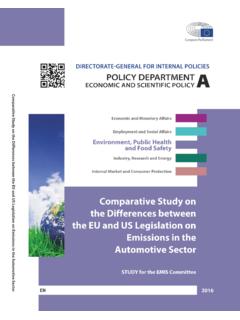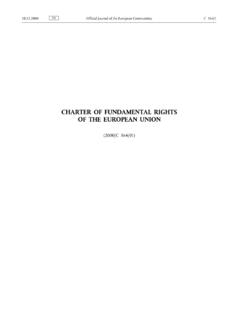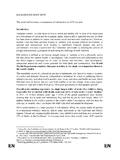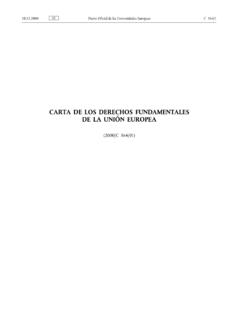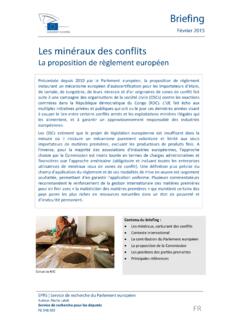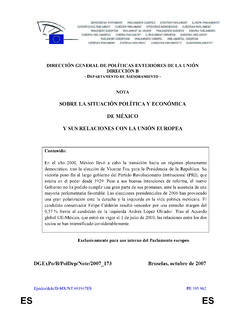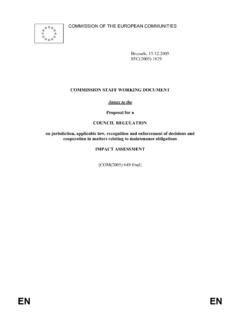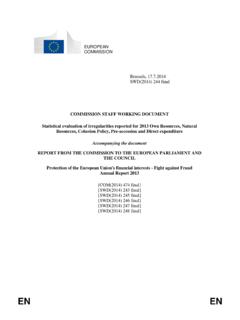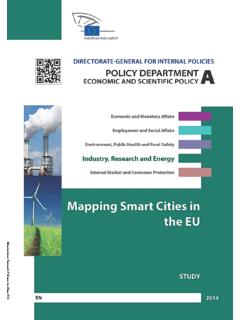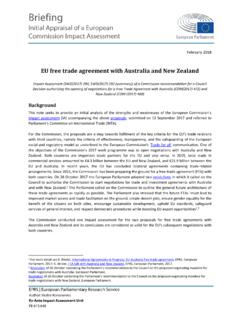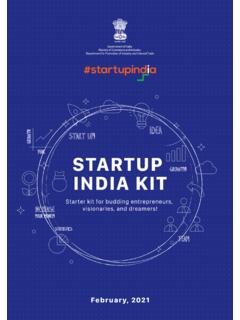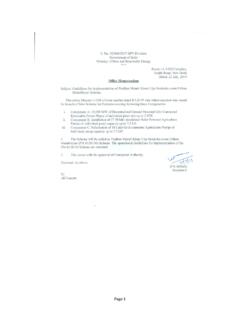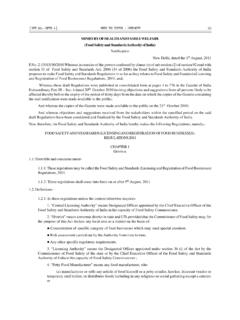Transcription of EU international procurement instrument
1 BRIEFING. EU Legislation in Progress EU international procurement instrument OVERVIEW. government procurement forms an important part of national economies. The EU has opened up its public procurement markets to third countries to a large degree, while many other economies have had limited appetite to liberalise market access. In 2012, the European Commission tabled a proposal for an international procurement instrument (IPI). The IPI would give the EU leverage in negotiating the reciprocal opening of public procurement markets in third countries. The Commission revised the proposal in 2016, taking on board some recommendations from the Council and the European Parliament. However, the revised proposal did not advance owing to differences in Member States' positions. In 2019, discussions in the Council gathered new momentum in the context of a growing recognition of the need to level the playing field in international trade. In June 2021, the Council adopted a negotiating mandate that added the threat of market exclusion to the price adjustment mechanism.
2 The Parliament adopted its position on the revised IPI proposal in December 2021, modifying its design, scope and application. The trilogues concluded successfully on 14 March 2022. Amended proposal for a regulation of the European Parliament and of the Council on the access of third-country goods and services to the Union's internal market in public procurement and procedures supporting negotiations on access of Union goods and services to the public procurement markets of third countries Committee international Trade (INTA) Revised proposal: responsible: COM(2016) 34. Daniel Caspary (EPP, Germany) Initial proposal: Rapporteur: Inma Rodr guez-Pi ero (S&D, Spain) COM(2012) 124. Shadow rapporteurs: Catharina Rinzema (Renew, Netherlands) 2012/0060(COD). Reinhard B tikofer (Greens/EFA, Germany) Ordinary legislative Jan Zahradil (ECR, Czechia) procedure (COD). Emmanuel Maurel (The Left, France) (Parliament and Herv Juvin (ID, France) Council on equal Next steps expected: Vote in plenary footing formerly 'co-decision').
3 EPRS | European Parliamentary Research Service Author: Marcin Szczepa ski Members' Research Service PE March 2022 EN. EPRS | European Parliamentary Research Service Introduction The EU has aimed to open up its public procurement markets to third countries to a significant extent. Desiring a certain degree of reciprocal access for its businesses on foreign public procurement markets, the EU has consistently advocated the need for more open international public procurement . In 2012, the European Commission proposed an international procurement instrument (IPI), aiming to both improve the conditions under which EU businesses can compete for public contracts in third countries and strengthen the EU's position when negotiating the access of EU goods, services and suppliers to foreign public procurement markets. The EU has attempted to achieve this both plurilaterally, within the context of the 2014 revised government procurement Agreement (GPA) in the World Trade Organization (WTO), and bilaterally, through its free trade agreements (FTA), such as the government procurement chapter of the EU-Japan Economic Partnership Agreement (EPA), which foresees the liberalisation of additional procuring entities and sectors in addition to those covered by the GPA.
4 Results have been mixed, however, as many emerging economies remain reluctant to join the GPA. or to open their public procurement markets to the EU bilaterally. In many economies, public procurement is seen as a legitimate tool to promote domestic production or employment ( the United States (US) Buy American Act), even if this leads to imperfect competition or cost inefficiencies. Governments protect their procurement markets in either an explicit or de jure manner, with rules or regulations, or implicitly (de facto) with language or administrative barriers impeding market entry even if unintentionally. The IPI seeks to address this imbalance. In 2016, the Commission issued a revised IPI proposal. After several years of legislative deadlock, the initiative resurfaced in 2019 as a result of concerns about the competitiveness of European industry vis- -vis emerging players such as China, as set out in the Franco-German manifesto for a European industrial policy. For instance, when in 2019 the Commission blocked plans for a Siemens-Alstom rail merger on competition grounds, critics argued that the merger would have helped the European rail industry to compete with the world's largest train manufacturer Chinese CRRC; the Commission pointed to the fact that Chinese suppliers had never taken part in EU public tenders in the sector and it will take a long time until they become 'credible suppliers'.
5 The debate spurred calls for a stronger EU industrial policy both internally in the single market and externally on international procurement markets. In March 2020 the Commission presented its new industrial strategy for Europe, calling for the swift adoption of the IPI. The renewed discussions on the IPI are also part of an endeavour by the EU to find answers to a more challenging trading environment for the EU. As the EU attempts take a more assertive stance in the context of its pursuit of open strategic autonomy, Member States now view the IPI as a more legitimate and necessary tool to pursue EU. business interests on a global scale. In this context, the IPI proposal is seen as a practical way to help improve reciprocity, as it could be used as leverage to induce partner countries to withdraw discriminatory measures. Above all, the IPI carries a political message about the EU taking action to rebalance its competitive position with regard to emerging economies. Economic context government procurement typically accounts for roughly 10 to 20 % of an average economy's gross domestic product (GDP); in 2016 the EU average for public procurement expenditure was about %.
6 In comparison, it was % in Japan and % in the US. Within the EU, the countries with the highest levels of public procurement were the Netherlands, Finland and Sweden, and those with the lowest were Ireland, Cyprus and Portugal. According to the Commission, in 2018 the EU had opened de jure some 352 billion worth of its 2 trillion public procurement of goods, services and works markets to bidders from GPA signatories ( Australia, Canada, Japan and the US). Important trade partners such as Brazil, China, india and Turkey have not (yet) joined the GPA. At the same time, the Commission has reported a clear increase in protectionist measures applied by countries such as Brazil, China, Russia and the US since 2. EU international procurement instrument 2013. The Commission estimates that half the global procurement market is currently closed to foreign bidders but that greater access could more than double EU procurement exports, adding 12 billion to the existing 10 billion in exports (tenders won by EU companies abroad).
7 This would Filling the data gap in public still represent a minor share of total EU goods and procurement services exports, which stood at trillion in 2018. Common hurdles faced by EU companies abroad Reliable statistical data on procurement is include: a lack of transparency (no online publication challenging to obtain, as a result in part of of notices or fragmented procedures), a requirement differing accounting standards. In 2019, to address this issue, the European for national establishment such as joint ventures Commission launched an international (China, Indonesia) or local establishment (Brazil, public procurement initiative (IPPI). The Indonesia), local origin requirements ( india 50 %, Commission's new database provides Indonesia 50 %) or the 'buy Chinese' policy (also detailed data on government contracts, present in the US as 'buy American'), and the exclusion including barriers that EU companies face. of major government procurement projects ( the The database includes information on Three Gorges Dam, the Bird's Nest and other 2008 nearly 40 million public contracts and Olympic venues in China).
8 Covers nine key EU trading partners: Australia, Brazil, Canada, China, india , Improved access to third countries' public Indonesia, New Zealand, Thailand and the procurement markets is of interest to competitive and US. growth-oriented EU businesses eager to gain access to new markets, in particular companies that are highly competitive in various segments traditionally covered by procurement contracts ( railways, road construction or telecommunications). In addition, economic analyses have shown that opening public procurement markets to international competition can increase GDP, and that closing them can have the reverse effect. Since the EU's public procurement markets are already de jure open to foreign bidders, it has proven difficult for the Commission to get third countries to commit to opening their public procurement markets through trade negotiations. On the other hand, third countries have argued that de facto EU public procurement markets are difficult to access, and cite low penetration rates for foreign bidders in EU.
9 Tenders. Even within the EU single market, cross-border integration remains limited; in 2015 the proportion of direct contracts awarded to foreign companies remained largely under 5 % for the EU-28. The common hurdles EU companies face when bidding for contracts in other Member States include gaps in the publication of tenders or use of negotiated procedures without publication in certain sectors ( IT solutions), as well as the lack of systematic data on national procurement systems. Existing situation EU legislative framework The EU has a relatively open public procurement market and gives equal treatment to bidders regardless of their origin. In 2019, the Commission issued guidance on the participation of third- country bidders and goods in EU procurement markets, addressing issues such as abnormally low tenders and quality standards. The guidance states that the EU should provide treatment that is no less favourable to signatories than to the EU's own companies. Yet operators from third countries with which no agreement is in place may potentially be excluded.
10 For the utilities sector (water, energy, transport, postal services), public buyers can reject tenders where over half of the value of the products come from third countries that are not covered by the GPA or a bilateral agreement. There are also exceptions in place for the security and defence sectors, allowing public buyers to refrain from giving access to third countries. However, this guidance is non-binding, and it is up to the procuring entities at governmental or sub governmental levels to exclude companies from non- covered countries for strategic reasons. As the fundamental principle of procurement is value for taxpayers' money, it is not necessarily in the procuring entities' interest to exclude potential bidders that can tender at a competitive price. 3. EPRS | European Parliamentary Research Service The general Directive 2004/18 for public works, public supply and public service aims to open US threat to withdraw from the GPA. procurement for bidders from anywhere in the EU, In February 2020, the Trump administration but does not contain provisions on non-EU bidders.
